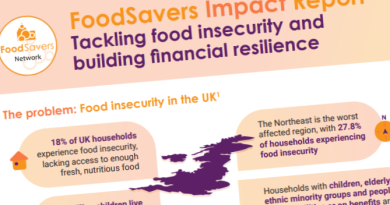Ten tonnes of potatoes
Since the start of the pandemic, we have helped a network of foodbanks and pantries to provide emergency food and support to people experiencing food poverty, alongside developing the FoodSavers network to provide next steps from crisis food provision. Benefit delays, benefit changes and low income continue to be the key drivers of the need for foodbank use.
From funds announced in the Chancellor’s spring statement, Bradford Council launched their Household Support Fund to help households hit by rising prices, particularly where benefits are not increasing in line with the price hikes. Some of this funding was targeted at supporting foodbanks and affordable food projects, as they help some of the poorest and hardest-hit households.
Feedback from ten of the projects indicates that they are currently providing 2,800 food parcels each month, with around 30% of the food being provided by Inn Churches through the Household Support Fund: that’s over 13,000 tins, packets, boxes, bags, jars and bottles in May alone (including ten tonnes of potatoes).
The provision of food has been challenging at times: there have been several stops and starts due to the last-minute nature of the funding given to the Council by central Government which makes planning quite difficult. We’re also aware from the ‘stops’ that for some foodbanks this provision has become crucial with the danger that when it stops, they will struggle to source enough food to meet demand. We need to look at a more sustainable approach, which is something that the Feeding Bradford & Keighley Network will be exploring at their next meeting.
We have found with our FoodSavers work that we cannot underestimate the importance of dignity. Foodbanks are currently vital. They are welcoming and supportive and provide a great deal of support. However, the FoodSavers model highlights constantly that many people experiencing poverty feel shame when accessing emergency support, and in particular free food:
It has been brilliant being able to access the food pantry. We have been through so many challenges in the last few years, and not being able to choose my own food was just the last straw for me.
My cupboards being stocked has meant that my husband and I have cut right down on our drinking. We are eating so much better now because we can access this food.
Bridging the gap: stories from the food projects
We have a customer who comes into our market a couple of times a week and loves the food we get in here. He works part time for minimum wage as well as being a carer for his wife, and he says that what we do is a great help to him as it is local to him and has a great range of food for his family, and therefore it helps him a lot. He has told us that he would not know how he would cope without the services that we provide to support him, and he always gives us regular feedback from his peers who say we are also a great help to them.
N began coming to the foodbank about a year ago and this provided him with essential food, but also a safe and welcoming place to meet others. He is now volunteering with us as he wanted to give something back. He is gaining in confidence and feels valued and less isolated.
We encountered an elderly lady living on her own, sick, and not able to walk much. She has no support and, every time I go, she’s in tears and continues to thank the foodbank for reaching out to her in her time of difficulty.
One of the clients we helped recently was a nurse, single mum with two children. HMRC changed her tax code in error leaving her short in her salary to provide food for the family. Although HMRC agreed to refund the tax, they said they were unable to do this until the following month. This lady was living on the breadline with no savings and had never accessed a foodbank before. She was so grateful for the support in bridging the gap until she received her refund.
L was in the same job for 21 years as a benefits advisor. Her partner worked seven days a week but then got ill, had to have his leg amputated and couldn’t work. He tried to do bits, but he never got any counselling, and feels useless. Then L got all her illnesses: she’s got stage 2 COPD (Chronic obstructive pulmonary disease) and, as she cares for her partner, had to give up her job too. The couple were private renting but then their landlady sold the house and they were faced with an eviction notice. With no jobs, they couldn’t save up to get a bond or hire a van and, before they knew it, they were out and had lost everything out of the house. They are now in temporary accommodation and just trying to survive on benefits, so the foodbank has been a lifesaver.
We have an elderly man that comes to our foodbank each week. He lives alone and has no family nearby. His only income is his pension, and he struggles to cope with the rise of living costs and increase of his gas & electric bills. He is grateful every week for the food he receives from us and always walks out with a smile on his face and thanks us for our help.




